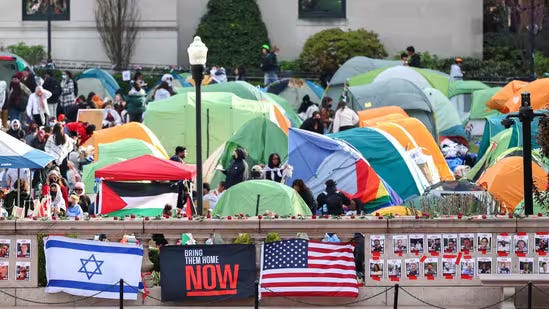Quelling the tentifada
Universities are missing an opportunity to foster greater understanding and discourse about the Israeli-Palestinian conflict
As campuses across the U.S. become hotbeds of protest over the Gaza conflict, a complex picture emerges—one of passionate advocacy marred by instances of unsettling antagonism. At the heart of these protests is a deep-seated reaction to the civilian deaths and the dire humanitarian situation in Gaza, a response that resonates deeply with students and faculty who advocate for peace and humanitarian relief. While much smaller in number, many Jewish students are protesting for more action to bring home hostages being held by Hamas.
While many protests remain peaceful, focusing on calls for a ceasefire and scrutiny of U.S. support for Israel, many are dangerously veering into antisemitism, which not only evokes deep pain among Jewish students but makes them feel unsafe.
I have not shied away on these pages from criticizing Israel’s actions in Gaza (and the West Bank) or calling on the Biden administration to do much more to hold the government and the military accountable and to take meaningful steps to address the humanitarian crisis.
Yet, this shift from legitimate protest as a platform of advocacy to harmful rhetoric and intimidation undermines not just the Palestinian cause but the academic integrity and inclusive environment universities strive to uphold.
Universities need to ensure that their campuses remain forums for free expression. But they also should be providing clear, context-rich education on sensitive issues like the Israeli-Palestinian conflict, ensuring students understand the weight of the terms and slogans they employ.
In this charged atmosphere, the invocation of terms like "apartheid" and "genocide" without a deep understanding of their implications or historical context does a disservice to all involved. It simplifies a complex issue, sowing division rather than fostering understanding.
When these protesters chant "From the River to the Sea," do they understand the phrase calls for the establishment of a State of Palestine from the Jordan River to the Mediterranean Sea, erasing the State of Israel and its people? Or that this is the rallying cry of terrorist groups and their sympathizers?
When they chant “Globalize the Intifada,” which uses the Arabic word for “uprising,” do they realize they are calling for widespread violence against both Israelis and Jews across the globe?
I doubt that few keffiyeh-wearing protesters praising Hamas as a liberator of the Palestinian people have read the group’s charter or comprehend the devastation and terror it has caused to the people of Gaza since it seized power in 2006.
To be fair, bad actors at these protests are far outnumbered by people who simply want to be heard.
But student movements advocating for human rights have the same responsibility to remain vigilant against the infiltration of hate-based rhetoric.
Universities are failing students by not living up to their commitment to an education free from agenda, that promotes open dialogue and that keeps them safe. The goal should be to foster a community that can engage in tough conversations on multi-dimensional topics without crossing into the realm of exclusion or fear. It’s called “higher education” for a reason.
The real educational journey involves grappling with complex issues head-on, facilitating tough conversations that do not shy away from the painful aspects of geopolitical conflicts. It's about preparing students to lead with empathy, informed by a thorough understanding of all perspectives involved, including the uncomfortable or unpopular ones.
Instead of crisis management - moving classes online, restricting access to campus, suspending students and canceling commencement - universities are missing an opportunity to foster a greater understanding of and productive discourse about, the conflict - like Dartmouth College and Princeton did.
Professors joining these protests need to do some serious soul searching. While protecting their students’ rights to free speech, they should also be teaching them to engage in critical thinking and respectful debate, without overlaying their own bias. The objective is not for everyone to agree, but to empower students to think for themselves.
Malcolm Forbes, the American entrepreneur who started Forbes magazine once wrote: “Education's purpose is to replace an empty mind with an open one.”
As universities navigate these turbulent waters, they must remember their mission to foster not just any dialogue, but one that enriches, educates, and elevates, turning today’s passionate students into tomorrow’s discerning leaders. This is the essence of higher education—transforming not just minds but hearts with the pursuit of knowledge and truth at its core.





I feel like you are spot-on. As someone who's lived in the Middle East and spent time in Israel and "Arab" countries, things are more nuanced than the students know. What a missed opportunity to distinguish Hamas from Arabs/Palestinians, Israel's current government from the Israeli people... etc.
A very passionate article which raises some really good issues. You raise an excellent point that anti Israeli government attitudes are not to be conflated with antisemitism. They're not. I revile the obscene behaviour of the Netanyahu government but have no animus towards Jewish people, culturally, ethnically and spiritually. It's a sad story when the two aren't differentiated so as to make life unsafe for Jewish students. I deplore that and will always deplore such behaviour.
But more interestingly is your discussion of the role ascribed to do higher education. I have had quite a bit of experience of this sector in the 90s. My only conclusion was that universities were sheltered workshops for the socially inept.
Dunning Kruger proved their point with university teachers. Academics are generally highly intelligent people who lack social awareness. Hence we come to your comments. What you describe is intelligent people doing incredibly stupid stuff. Unfortunately stupid people don't realise that they are stupid.
There's a short YouTube video with John Cleese discussing this very point.
https://youtube.com/shorts/55sMMBwqv0k?si=ENL9e-SrCnhlJFRv